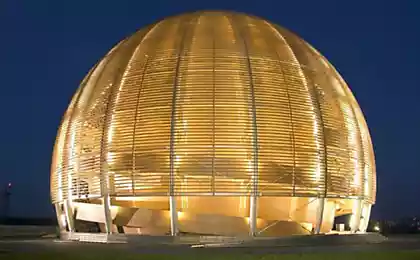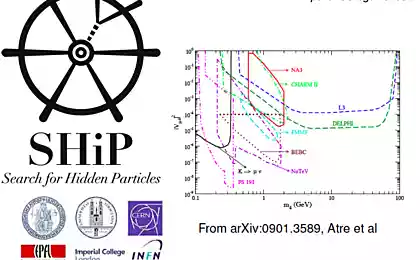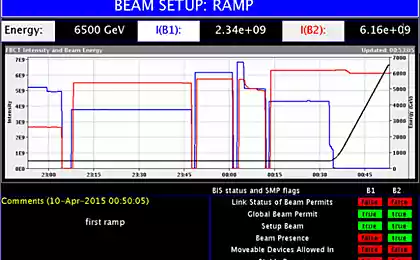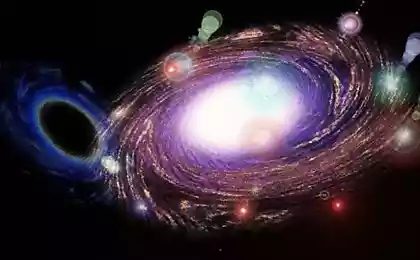1312
CERN released data on collisions of particles in the raw
This is a translation. Original: «CERN makes public first data of LHC experiments ». i>
CERN launched Open Data Portal , thus for the first time disclosed the real collisions, the LHC experiments produced. Now anyone can analyze the particle collisions, not having their own BAC.
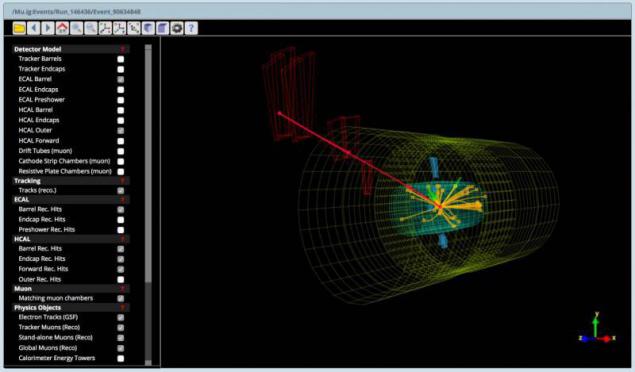
The event monitor CMS in the web application, available on the website shows the collision of protons recorded CMS detector
(Image: CMS / Open Data Portal) i>
"Running" CERN Open Data Portal "is an important step for our organization. Data from the LHC are among the most valuable assets of the LHC experiments. Today we begin to openly share them with the world. We hope that these data will support and inspire the community of researchers around the world, including students and civilian scientists, "- said the launch of the portal CERN Director General Rolf Hauer (Rolf Heuer).
The principle of openness enshrined in the Basic Agreement CERN. All BAC publications were published with open access, free to read and re-use. Empowering recently approved the LHC cooperation Open Data policy and will publish data on collisions in the future.
The first published and analyzed by high-level data on collisions are the data CMS (Компактный Muon Solenoid ) and were originally collected in 2010 after the first run of the LHC. Now, this data set will be available in the public domain on the site CERN Open Data Portal. Together with them will also be available Open source software for reading and analyzing them with the appropriate documentation.
"It's new for us and we are very interested to see how these data will be used, - says the coordinator for the retention of data CMS Lassila-Perini Katie (Kati Lassila-Perini). - We have developed tools and examples of various levels of complexity, ranging from a simplified analysis to ready-to-use online applications. We hope that these examples will stimulate the creativity of new users ».
Parallel to this, CERN Open Data Portal provides access to additional data sets obtained from ALICE, ATLAS, CMS and LHCb groups. These data have been prepared specifically for educational purposes, such as international master classes for Particle Physics, which annually involves more than 10,000 students. All of these resources are accompanied by tools for visualization.
"Our own policy data implies the preservation and dissemination of data. In the past, we have seen how students are fascinated by the ability to analyze data from the LHC, so we are happy to take that first step and make available sample data for training, "- said Silvia Amerio (Silvia Amerio), Coordinator for the Conservation of data LHCb experiments. < br />
"Development of an open data portal is a first step in our mission of preservation and dissemination of research materials from our customers. It will provide access to data and their processing facilities and will do so that they will be used in the present and the future ", - says Tim Smith (Tim Smith) of the IT department at CERN.
All data on OpenData.cern.ch distributed under the Creative Commons CC0 public domain dedication license; data and software have unique identifiers DOI giving citations to scientific papers; software is also distributed under open source license. CERN Open Data Portal is built upon open-source Invenio Digital Library software, which work and other CERN Open Science Instruments.
Source: geektimes.ru/post/241874/
CERN launched Open Data Portal , thus for the first time disclosed the real collisions, the LHC experiments produced. Now anyone can analyze the particle collisions, not having their own BAC.

The event monitor CMS in the web application, available on the website shows the collision of protons recorded CMS detector
(Image: CMS / Open Data Portal) i>
"Running" CERN Open Data Portal "is an important step for our organization. Data from the LHC are among the most valuable assets of the LHC experiments. Today we begin to openly share them with the world. We hope that these data will support and inspire the community of researchers around the world, including students and civilian scientists, "- said the launch of the portal CERN Director General Rolf Hauer (Rolf Heuer).
The principle of openness enshrined in the Basic Agreement CERN. All BAC publications were published with open access, free to read and re-use. Empowering recently approved the LHC cooperation Open Data policy and will publish data on collisions in the future.
The first published and analyzed by high-level data on collisions are the data CMS (Компактный Muon Solenoid ) and were originally collected in 2010 after the first run of the LHC. Now, this data set will be available in the public domain on the site CERN Open Data Portal. Together with them will also be available Open source software for reading and analyzing them with the appropriate documentation.
"It's new for us and we are very interested to see how these data will be used, - says the coordinator for the retention of data CMS Lassila-Perini Katie (Kati Lassila-Perini). - We have developed tools and examples of various levels of complexity, ranging from a simplified analysis to ready-to-use online applications. We hope that these examples will stimulate the creativity of new users ».
Parallel to this, CERN Open Data Portal provides access to additional data sets obtained from ALICE, ATLAS, CMS and LHCb groups. These data have been prepared specifically for educational purposes, such as international master classes for Particle Physics, which annually involves more than 10,000 students. All of these resources are accompanied by tools for visualization.
"Our own policy data implies the preservation and dissemination of data. In the past, we have seen how students are fascinated by the ability to analyze data from the LHC, so we are happy to take that first step and make available sample data for training, "- said Silvia Amerio (Silvia Amerio), Coordinator for the Conservation of data LHCb experiments. < br />
"Development of an open data portal is a first step in our mission of preservation and dissemination of research materials from our customers. It will provide access to data and their processing facilities and will do so that they will be used in the present and the future ", - says Tim Smith (Tim Smith) of the IT department at CERN.
All data on OpenData.cern.ch distributed under the Creative Commons CC0 public domain dedication license; data and software have unique identifiers DOI giving citations to scientific papers; software is also distributed under open source license. CERN Open Data Portal is built upon open-source Invenio Digital Library software, which work and other CERN Open Science Instruments.
Source: geektimes.ru/post/241874/
In the Ministry of Communications Bill Mikhalkov considered an attempt to legitimize piracy
Geek House

